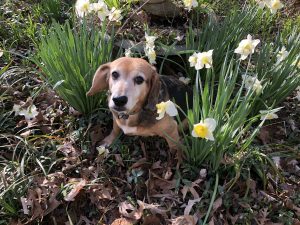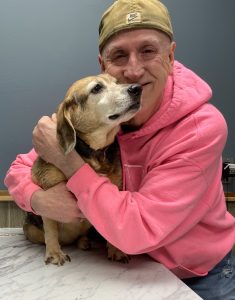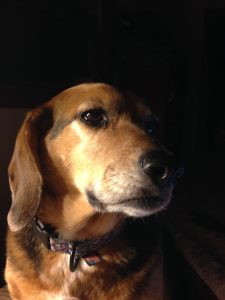
This morning, I carried Juju Mommadawg to the car and loaded her in the passenger seat. I’ve done it a thousand times over the past fifteen years. Driving with her beside me to Doubletree Animal Clinic, I passed the bend in the road where Mommadawg and three of her siblings were dropped off and abandoned a decade and a half ago. I’m not sure what became of two of them. I hope someone rescued them and gave them good homes.
I passed the bridge where I stopped one clear autumn night when I heard Mommadawg and Willie running through the hills under a dazzling harvest moon with their bays echoing at who-knew-what. I remember that specific moment; I prayed the Lord would help us catch those two pooches. I thought, Remember this moment. Take a heart picture.
A few months later, I was able, with the help of a sedative-filled pill pocket, to chase her drunk brother Willie through Fern Cliff Presbyterian Camp and catch him. He became a lifelong companion to friends from church. He died four years ago from cancer. I was able to take Mommadawg to the Herndons’ home. She and Willie spent a couple of hours loving on each other before Willie made his journey home.
I passed the same Presbyterian camp where, a few months later, I found Mommadawg’s first litter of five-week-old puppies curled up together in the roots of a downed tree. Those ten pups stayed at the clinic until they were old enough to find forever homes. Except for the last one. I brought him home. His name is Chester.
I passed a few places while driving down Ferndale Cutoff where we tried unsuccessfully to catch Mommadawg during her first two years. She was a wily, slippery foe. The same sedative-filled pill pockets that worked so well on Willie never worked on her. She easily slipped through our hands and ran into the woods. Every time. We knew she was watching. We just never knew where from.
Finally, during her third pregnancy (our small community referred to her as the Ferndale floozy) someone called the clinic and said they had trapped her inside a fenced-in area where a huge propane gas tank lived next to a local convenience store. Dr. Peck and Jenny immediately jumped into Dr. P.’s truck, raced to the store with a retractable rabies pole, and gathered her up.
They called me. I raced to the clinic, where we spent hours bathing Juju and picking ticks and fleas off her. There wasn’t a square inch of her little body that didn’t have a tick or flea. Dr. Peck sedated her for the procedure because she wasn’t used to being touched. No human had petted that precious girl for two and a half years. We spayed her and gave her every med she needed to become healthy. We treated her for heartworms, which took more than a year to eradicate.
We made a comfortable home for Mommadawg in one of the outside runs. We turned a spacious cleaned-out trash barrel onto its side and filled it with blankets to keep her warm.
She became my project. Every day, I would open the gate of her run, and she’d scurry out to potty in the fenced-in area behind the clinic. She’d race to the grass and do her business, keeping a sharp eye on me in case I tried to get too close to her.
Then the chase would begin. The little storage building in the center of the potty area became her barricade. No matter which side I tried to surprise her on, she would dart away and run to the other side. I could not catch her. I’d grab stuff and try to build a fence made of boxes and old lumber on one side, hopefully trapping her so I could grab her. It never worked. She broke through or jumped over every time. She’d eventually tire of the game, jog around the back side of the kennels, and spring into her run. After closing all gates, I, gasping for breath and furious, would drag myself into her run.
Once again, vainly attempting to avoid me, she would jump on top of her barrel. I’d grab her and sit in the run with her across my lap. At first, she tried to wriggle away. But I held tight. I held her, hugged her, whispered to her, petted her, and loved on her until she finally stopped resisting and relaxed, settling quietly in my lap.
We shimmied through that dance for about an hour every day for months. All the friends I worked with at the clinic kept saying, “You’re gonna keep that dog.” I adamantly told them I wasn’t.
About three months later, when I got her home, a whole new set of challenges began.
Mommadawg was a flight risk. I had to take her out on her leash, or she’d run. Late at night, no matter the weather, if she slipped out on her own, I was forced to leave the sliding door open a crack and turn off all the lights. After she romped through the woods for a couple of hours, baying at the moon and waking all the neighbors, she’d sneak back into the house. Then she’d jump up onto the couch, thinking she’d really gotten away with something.
Early on, I learned she liked potato chips, so trying to persuade her, I routinely made a Hansel and Gretel trail from the sidewalk all the way up the deck, where I’d end the snacks just inside the house. Mommadawg would cautiously eat the chips, chewing suspiciously, trying to ascertain which bush I might be hiding behind, until she stepped inside the house. I, with more agility than I’d known I possessed, jumped out of a corner and slammed the sliding glass door behind her.
But one winter night, she chose not to play fair. She wouldn’t follow the trail of chips.
It was about midnight. The temperature was about 40 degrees. I was about freezing.
I had my bag of chips in hand. Mommadawg was just out of reach. I could see the cast of her silhouette in the safety light outside. I stood in the frosty grass and called her name as sweetly as my chattering teeth allowed: “Momma! Mommadawg!” She just sat there.
I got up and tried to mosey toward her, and she ran to the edge of the woods. I put a few chips on the ground. She smugly scowled at them.
I thought maybe she felt threatened by my being taller than she was. Maybe if I got down level with her, I thought, she’d feel less intimidated and come over to get the tasty chips.
So I lay down in the damp grass, put some chips on the ground at arm’s length, and, because it was cold, sort of curled up into a ball. I started calling for her. “Momma! Momma! Mommadawg!”
Somewhere in the middle of that lesson in futility, I thought, If the neighbors are looking outside right now, they’re watching me lie in my front yard on frost-covered grass in the fetal position at midnight, calling out pathetically for my mother, cradling a bag of potato chips.
I gathered the one molecule of dignity left in me, stood up, and slinked back inside.
I left the sliding glass door open a bit, giving all the heat in the house permission to leave. I lay down on the couch. Eventually, I heard Mommadawg jump up and perch herself on the sofa and gawk at me. She was cocky, as if she’d proven some kind of alpha-dog point.
Believe it or not, there was a lesson to be learned there.
Mommadawg could run for a while. She could try to be on her own and self-sufficient. But in the final analysis, she knew where she was loved and safe, and that was where she returned. Every time. Eventually.
It’s good to know where we are safe. It’s good to sense whom we can be safe with. It’s vital that we have a network of forever family we know are walking this journey with us, the ones who call us to honesty and give us the freedom to not be okay. It’s crucial that we know who will wait for us through the cold night.
When I first brought her home, Mommadawg basically lived under the bed until I put food out for her. She would crawl out, eat, and crawl right back under, unless I grabbed her and sat on the couch, continuing the petting and hugging process, which she hated. At night, I’d pick her up and set her at the foot of my bed. She would immediately jump down and under the bed, where she stayed all night.
One night, though, after several months of moving from fear to obvious obstinacy, she stayed on the bed all night. It was a miracle. I was happy.
That was our routine for a few months.
Then, one night, I woke up, looked at the foot of the bed, and noticed Mommadawg concentrating intently on me. We lay there for a long while, just peering at each other. I eventually cautiously held my hands out toward her. She considered the gesture for a bit. Then she stood up and walked toward me. She lay down next to me and gently rolled over onto her back. I rubbed her belly. All her fear and loneliness were gone. She discovered that being by my side brought her peace and contentment. From that moment on, she knew she was safe. All I had to do was hold out my arms, and she’d throw her head back, and those floppy ears would come running.
I drove Mommadawg to the clinic this morning. Her congestive heart failure betrayed her hard-earned skills of survival. I held her close to my chest for most of the night. A few times, through labored breathing, she gazed at me with so much love and acceptance that my heart broke. She knew it was time. She knew she was ready.
I wasn’t.
I texted Dr. Peck at two thirty in the morning and told him I thought Mommadawg was telling me she wanted to go home. I asked him to text me when he got to the clinic.
He texted me when he arrived at the office this morning.
I drove Mommadawg to the clinic. I passed a bunch of memories on the way, and for the first time ever, I thought of something essential. In all the years I’ve fed, loved, hugged, and cared for her, Mommadawg never once growled. Never. She only bayed when she was running through the woods. The only time I ever heard her bark was at five o’clock every morning, almost to the second, to go outside. I never once heard her growl, bark, or snarl or saw her bare her teeth at the other pooches or anyone. Never. She never complained or reacted. She only responded with love, intelligence, and, I’m positive, thankfulness.
Even this morning, as I held her close to my chest at the clinic, she looked up at me and, in her precious, understanding way, let me know I was even then taking care of her and keeping her safe.
I held her gaze and said, “Juju, I love you. I love you. You have been my treasure. You’re about to go on your greatest, most joyful adventure. Don’t be afraid. You’re about to see beautiful things and colors and people and animals. They will take care of you till I get there. You’re going to see Jesus before I do. Tell him I love him and can’t wait till we’re all together. Lick his face. Jump around, and be happy. You’ve loved me so well. You did your job.”

Dr. Peck prayed.
And now I hold on to this solid truth, this strong hope:
That’s why I don’t think there’s any comparison between the present hard times and the coming good times. The created world itself can hardly wait for what’s coming next. Everything in creation is being more or less held back. God reins it in until both creation and all the creatures are ready and can be released at the same moment into the glorious times ahead. Meanwhile, the joyful anticipation deepens. (Romans 8:18–21 MSG)


